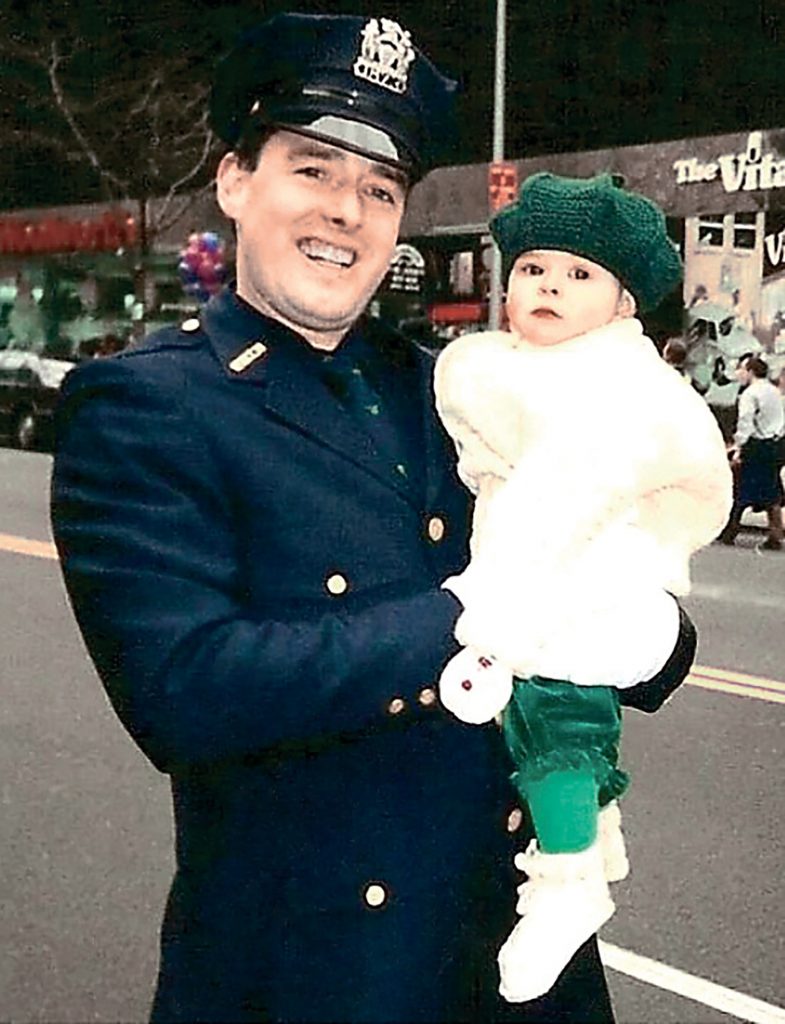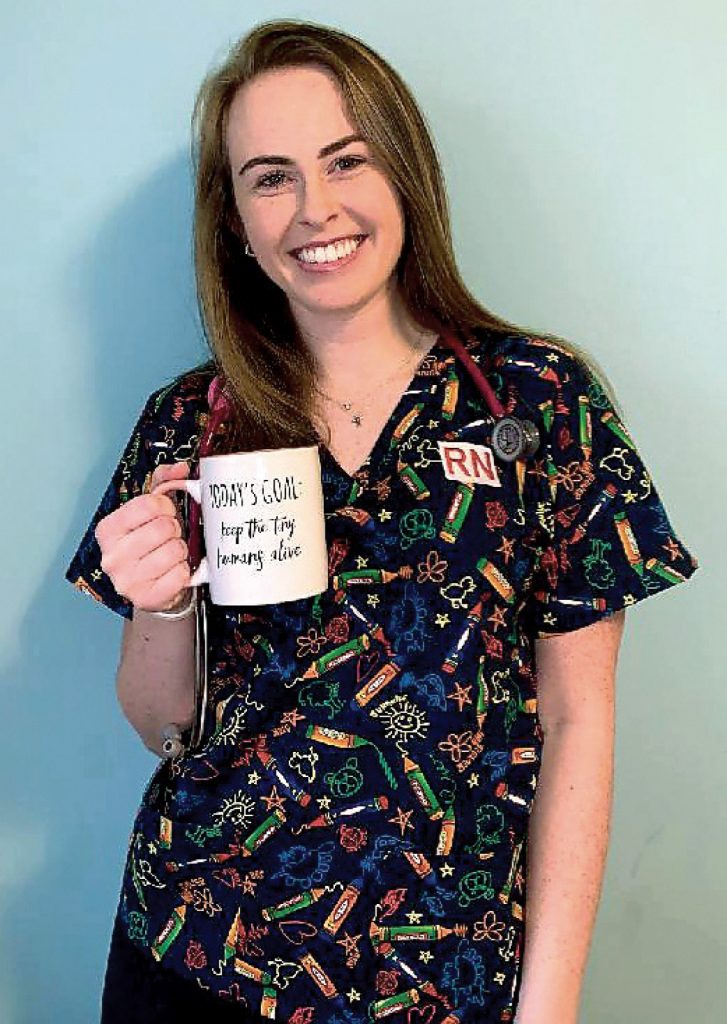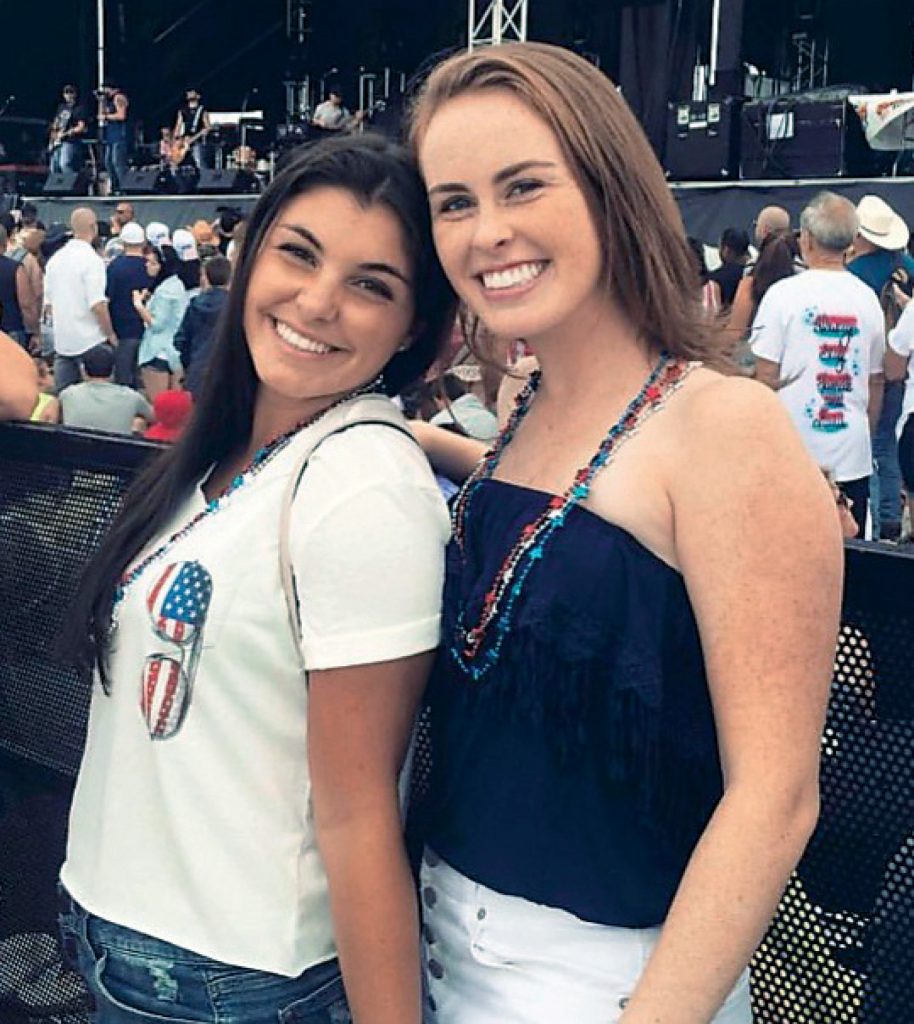
Caitlyn McIntyre was 5 years old when her father was killed in the line of duty. A tragic and sad event for a young child yet, for Caitlyn, the beginning of a confluence of other tragedies that not only helped define her life but showed all who Caitlyn McIntyre is.
The 24-year-old registered nurse’s father, Donald “Donnie” McIntyre, was a 38-year-old, 16-year veteran of the Port Authority of New York and New Jersey Police Department when he was killed on September 11, 2001, in the World Trade Center. Donnie evacuated and rescued people in the North Tower, the first tower attacked. He went on to climb the stairs of the South Tower, helping people escape impending doom. He continued climbing, saving more lives, and then climbed again to save others. With the South Tower’s remaining strength being eroded by a jet-fuel-fed inferno, Donnie knew what was happening but also knew what he had to do, what his oath required and what those trying to survive needed. He continued his ascent, making it to the 32nd floor before the tower took his life at 9:59 a.m. Donnie was one of 37 Port Authority police officers killed that horrific day — the greatest loss of police officers in a single incident in the history of American law enforcement. Donnie’s body was never recovered.
Caitlyn does not have recollections of her father or September 11, but she does remember being known as the “9/11 girl” in school. The publicity surrounding September 11 was difficult. Watching father–daughter interactions of other families left her envious and sad, but it didn’t dampen what was to become her desire to help people through their darkest moments. A desire, she believes, that grew from the courageous acts of her father and the inspiration of her mother Jeannine, also a registered nurse. Jeannine says, “Caitlyn is an inspiration to me, such a good heart, always very positive and motivated, and she looks just like her dad.”
The influences on Caitlyn reached beyond her family. Her dear friend, Caitlin Nelson, died on April 2, 2017, after a tragic campus accident while a junior at Sacred Heart University in Connecticut. Caitlin, who was studying social work, and Caitlyn, a nursing student at the University of Scranton, hoped to work together after graduation as a nursing–social worker team in a hospital. The Caitlyn/Caitlin friendship went deeper than their professional career goals: Caitlin Nelson also lost her dad, Port Authority Police Officer James Nelson, on September 11, 2001, at the World Trade Center. The girls were both 5 years old when their mothers introduced them at a 9/11 memorial ceremony. Both were fascinated that they shared the same name (though spelled different). Their friendship, born in the ashes of 9/11, lasted through Caitlin Nelson’s death and beyond.

After Caitlin Nelson’s death, Caitlyn traveled to Manhattan’s New York Columbia Presbyterian Medical Center to be with Caitlin’s mother for the arrival of her body from a Connecticut hospital, fulfilling Caitlin Nelson’s desire to be an organ donor. Caitlyn knew she had to be there, “I did not know if I would have another opportunity to say goodbye.” Caitlin’s final act of saving the lives of others led Caitlyn to work with transplant patients at Columbia Presbyterian. Caitlin Nelson’s death also left Caitlyn a lasting gift: mourning her father, the closure having eluded her for 19 years.
Caitlyn earned a Bachelor of Science in nursing degree, was hired by Columbia Presbyterian and found herself working with heart transplant patients, leading to a career that included the blessings of meeting all but one recipient of Caitlin Nelson’s organs.
Caitlyn recalls one patient, an older gentleman, who told her of his son’s love of basketball. She listened as the patient told her how his son’s playing days were derailed by illness, but that thankfully he recovered and was playing again. One day, as Caitlyn was caring for the patient, a tall man walked into the room; this man turned out to be the patient’s son. It was only later, when Caitlyn met the recipients of Caitlin Nelson’s organs, did she realize her patient’s son was one of Caitlin’s organ recipients. He received a life-saving kidney transplant.
The 9/11 thread became clearer to Caitlyn as she reminisced, “I didn’t think I knew then how well it would align.” A life marred by tragedy, yet not a tragic life. “I try to turn something negative into a positive,” she said, “I see the beauty of that.”
Caitlyn, a beautiful young woman with a big, bright smile, light brown, flowing hair and her father’s big blue eyes, was severely tested in the late winter of 2020 as the COVID-19 pandemic laid claim to thousands of lives. Caitlyn, like all medical professionals, became immersed in caring for COVID-19 patients. She knew how to save lives, but the virus was not fully understood. Much like her father climbing those stairs, she knew the situation was dire and yet selflessly continued to provide care to those in desperate need.

Caitlyn was assigned her first COVID-19 patients in March 2020. She thought about the similarities of what she was facing and what her father encountered, saying, “I was so mindful of it, my dad didn’t know what he was walking into, it was my time to step up.
“In the beginning, the environment was terrifying,” Caitlyn remembered, “there were no success stories, we were just trying to help people survive.” Her first three patients died. Anxiety grew and thoughts of her father’s final moments became her mantra — “If he can do it, I can do it.” Every day Caitlyn wrote her father’s badge number, 1873, on her wrist as a reminder, helping her through her emotionally grueling 12-hour shifts. The hospital became overwhelmed, the work unpredictable, colleagues became sick, the hospital was short-staffed and patient care maxed out.
The pandemic continued. Caitlyn and her colleagues pressed on through exhausting days surrounded by suffering and death. Caitlyn, like her dad, knew giving up was never an option; Caitlyn climbed her father’s stairs and saved lives. “Nothing is more beautiful than to be there for someone in need,” she said.
Recently, Caitlyn transferred to the hospital’s Pediatric Cardiac Intensive Care Unit working with children with congenital heart defects. “At times it is really sad, no one wants to see a sick child,” she said, “but, there is a joy; they can be the sickest kids but still smile.” Caitlyn embraces the love she sees in their smiles and returns it, saying, “What’s better than to be loved at your darkest moment?”
Caitlyn McIntyre is keenly aware that her life has been greatly affected by two major events of this young 21st century. Caitlyn is a young woman who possesses wonderful gifts, the greatest being the gift of acceptance: accepting the tragedies of her life and moving forward with love and selflessness to help others survive. Her dad is so proud.





